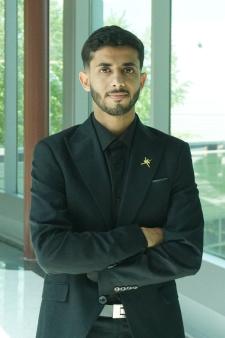Cybersecurity student is unlocking opportunities and finding success
A modern version of a traditional children’s game, Capture the Flag, is an important tool for cybersecurity students and one that helped Aus Al Rasbi solidify his decision to pursue a bachelor’s degree in cybersecurity at Western Michigan University.
“Solving Capture the Flag scenarios is exciting because there is always something new to learn and new challenges to overcome that can be applied in business,” explains Al Rasbi, an international student from Oman. In the cybersecurity field. Capture the Flag involves ethical hacking where participants try to exploit security vulnerabilities in a simulated organization. When they find a hidden piece of information, they have “captured the flag.”
It is that hands-on learning that Al Rasbi seeks as part of his college education at WMU. He relishes solving problems and is excited about the growth of AI and machine learning in cybersecurity, especially how AI can improve threat detection and response in real time.
“Some unique opportunities in cybersecurity include protecting organizations from cyberattacks and making a real difference in digital security,” says Al Rasbi. “When applied responsibly, AI has the potential to make systems more secure by identifying attacks faster and adapting the new threat. However, the field also has challenges, such as keeping up with rapid technological changes and staying ahead of attackers. AI can also be used to create sophisticated attacks, making it a constant race to stay ahead of threats.”
Al Rasbi, who plans to graduate in 2026, is using his time at Western to learn the theoretical knowledge of his craft and to develop the hands-on skills a career in this field demands. That goal includes coursework, co-curricular opportunities and internships. With the influence of Dr. Alan Rea, professor and co-director of the cybersecurity program, Al Rasbi is inspired to achieve his goals.
“Dr. Rea’s passion for cybersecurity and dedication to teaching truly inspired me. He made complex topics easier to understand by focusing on hands-on experience,” says Al Rasbi. "His teaching style is more technical than theoretical, which helped me develop practical skills. He was always available whenever any student needed help.”
The hands-on labs on topics such as Linux Administration, Windows Administration and Secure Web Applications and Technologies have engaged Al Rasbi and helped him understand how cyberattacks work while ensuring he has the skills he needs to enter the profession.
“I especially enjoyed applying what I learned in class to virtual lab environments such as attempting to hack a website, identifying its vulnerabilities, and exploring the techniques to mitigate them,” says Al Rasbi. “These practical exercises gave me a real world understanding of how to defend against cyber-attacks.”
Developing practical skills in a technology field is so important to Al Rasbi that also took an opportunity to work as an intern at OMIFCO in Oman where he worked on various aspects of IT.
“One of my favorite moments was learning how to configure firewall policies and immediately seeing their impact on network traffic control while monitoring packet flow,” says Al Rasbi. “That internship motivated me to pursue more highly technical skills, especially those focused on system security and network defense.”
Always seeking opportunities to practice skills, Al Rasbi participated in a social engineering competition during a TechJam event, sparking still another interest.
“During the competition, I investigated a case, identified red flags and analyzed whether the situation was part of a scam, helping me understand the tactics used by attackers. This experience led me to explore and study the human-focused side of cybersecurity.”
While Al Rasbi looks forward to his career and hopes to work in a security operations center of a leading tech firm, he is also grateful for the welcoming WMU community that has made his time in Kalamazoo a success.
“Moving to Kalamazoo wasn’t easy at first. I had to adjust to a new culture, different weather, and being far from my family. The support from family, professors and staff made things easier. The transition was better than I expected, and I began to feel comfortable quickly.” says Al Rasbi. “What really helped was the Omani Student Association. They helped me find an apartment and settle in and made me feel like I was surrounded by family because they were so friendly and welcoming.”
Learn more about Western’s cybersecurity program at wmich.edu/cybersecurity.
For more WMU news, arts and events, visit WMU News online.


